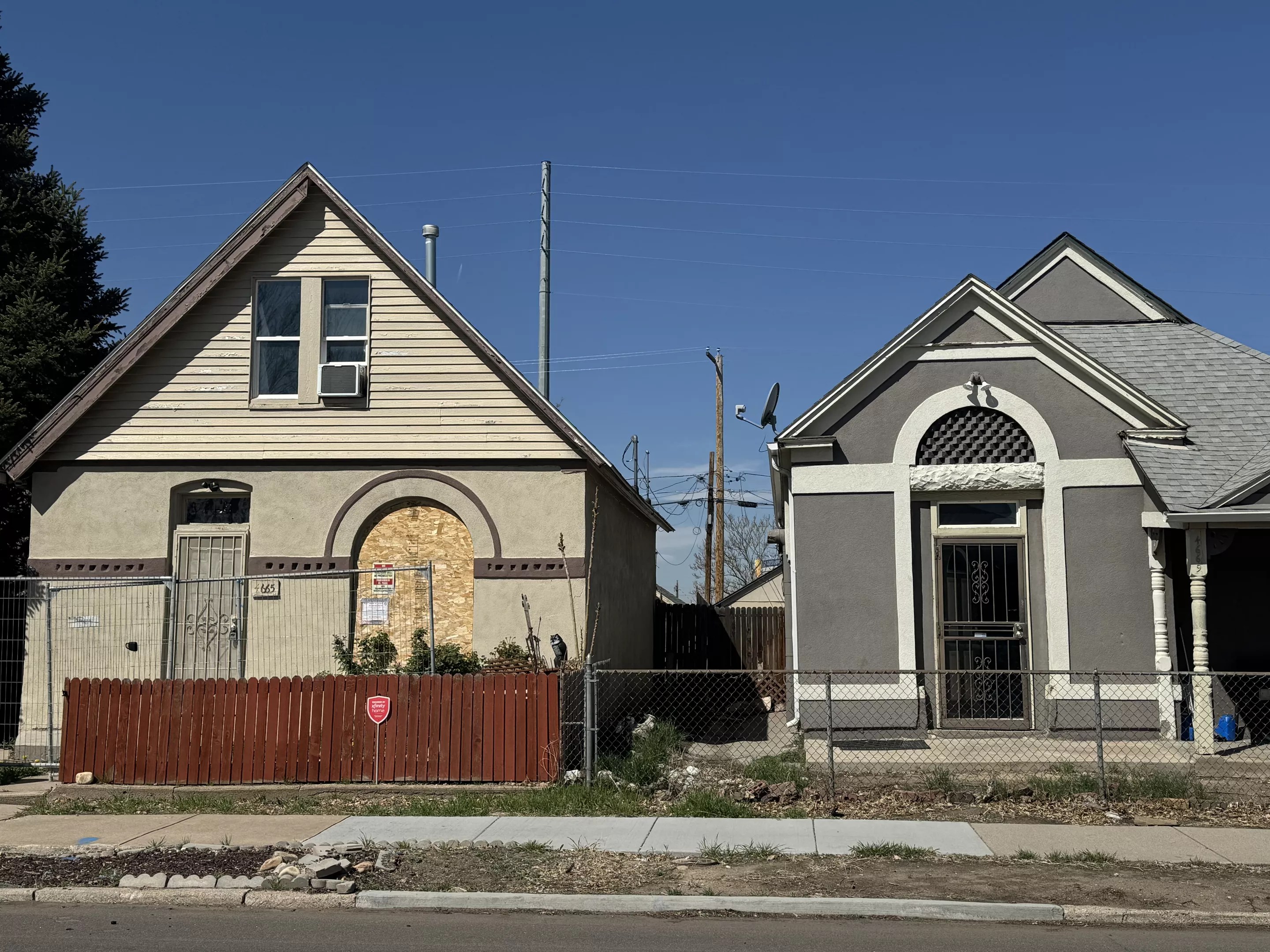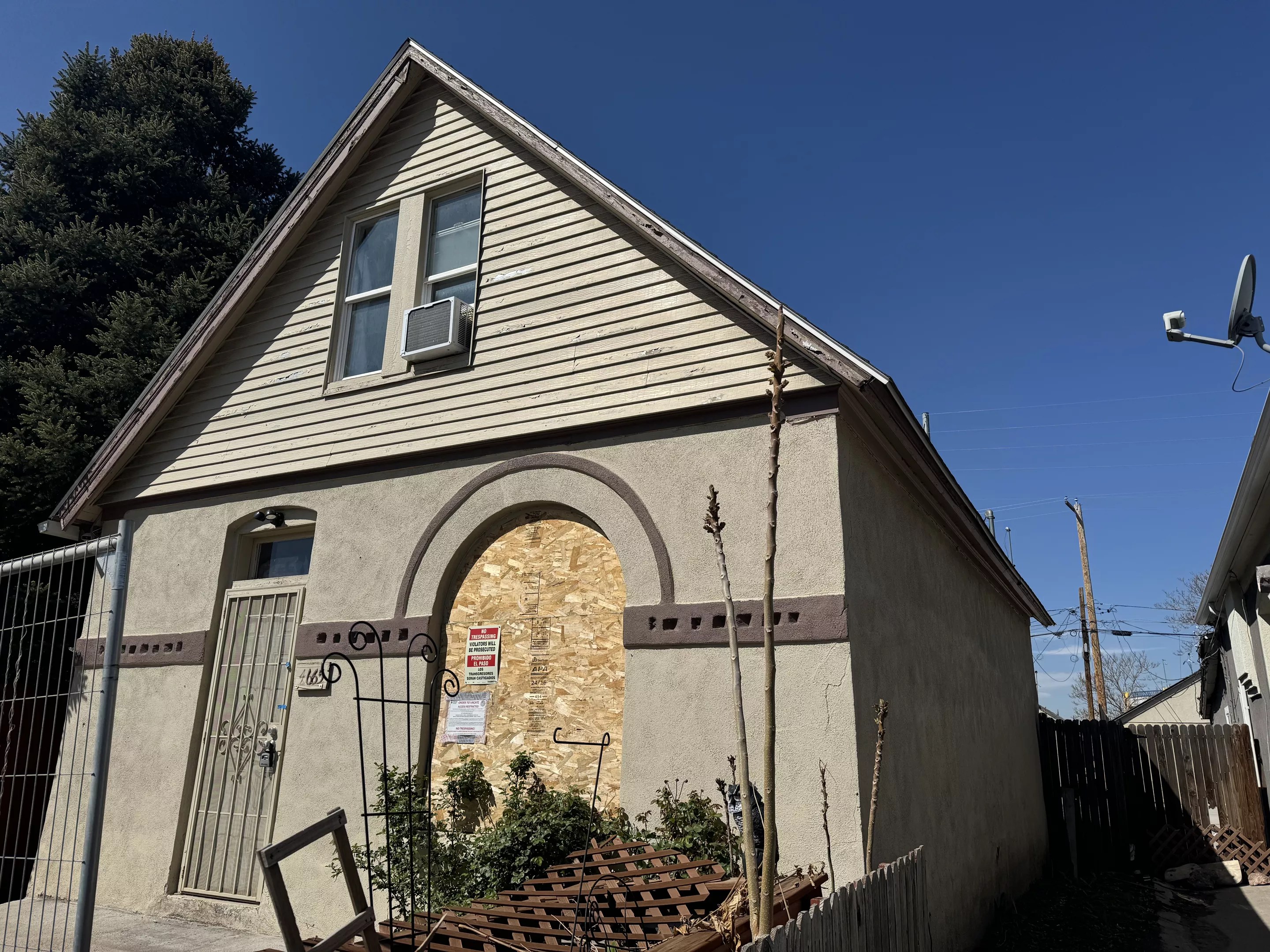
Catie Cheshire

Audio By Carbonatix
Nicole Nelson has lived in the Elyria Swansea neighborhood for thirteen years, proud that she’s the first person in her family to own a home. But for the last several years, Nelson’s dream has taken on nightmarish qualities as the home right next door to hers sits empty, attracting vagrants and causing problems that spill onto her property.
Worried about more damage to her home and run-ins with squatters since a small fire occurred in the garage last fall, Nelson says she has contacted both police and city officials to hold the owners of the vacant property at 4665 Josephine Street accountable.
“I tried my best to see if I could get some help, because I’m single and I have a disability, so it’s kind of scary,” Nelson says.
Nelson has complex regional pain syndrome, a condition that causes intense chronic pain in one of her feet. Along with making mobility difficult if a confrontation with a squatter occurred, Nelson says her disability has also made it difficult to mitigate other problems caused by the vacant property, like the time a fence fell and ripped out her window air conditioning unit. She says she tried to fix the unit by reorienting it with tape from the inside, but she wasn’t strong enough to lift the fence off from the outside.
Much to Nelson’s surprise, the property causing her these problems is owned by Colorado Community Land Trust, a subsidiary of Habitat for Humanity of Metro Denver. Habitat for Humanity is a nonprofit dedicated to providing affordable housing.
Nelson says when she moved into her home in 2012 Habitat for Humanity helped her paint the house, fix up her gate and make a few other improvements. She generally thinks of the organization as a good one, but is getting frustrated with the problems caused to her home.
“This is bad for me,” she says. “I’m just struggling to try to make it.”
Habitat for Humanity merged with Colorado Community Land Trust in 2020, the same year CCLT had bought the 4665 Josephine home. The trust buys the land properties sit on to make it possible for homeowners of properties on the land to have more affordable mortgages.
For the first few years Habitat for Humanity owned the place, a family lived inside the home, according to Laura Willetto, director of communications and marketing for Habitat for Humanity of Metro Denver.
Willetto says the organization learned in 2023 that the homeowner had died and defaulted on the loan. Between the time of the homeowner’s death and the time Habitat for Humanity realized what was going on, squatters had moved in.
Habitat for Humanity of Metro Denver then bought the home out of foreclosure, so the nonprofit currently owns both the land and the house. The idea at the time was that the group could renovate the home, or demolish it and build different affordable housing on the property.
Willetto says the home has been boarded up since 2023, and that Habitat has worked with the city since last fall to install construction fencing, disconnect the utilities and mitigate other issues. Someone from the organization goes to the property monthly to conduct maintenance, she says.
In July 2024, the city of Denver added the 4665 Josephine property to its Neglected and Derelict Building list, a registry of unoccupied buildings that are unsafe, nuisances or in violation of city code; the property is still on the list as of this month, according to Denver Department of Community Planning and Development communications director Ryan Huff.
A sign on the front door of the property states the home has been deemed unsafe by the Denver Department of Public Health and Environment, requiring remediation.
Willetto says Habitat wants to demolish the house, but there is meth contamination in the house and asbestos in the garage. Because of the high costs of eliminating those contamination sources, transforming the property will be costly. Finding the money will be tough given the organization’s nonprofit status and limited resources, she adds.
The property has also accumulated $1,547 in city fines, according to Huff. When Westword asked Willetto about the fines, she said Habitat wasn’t aware of the fines and quickly wrote a check to pay them off. Huff says that Habitat has now paid for recovery costs for boarding up the property, but fines are still on the table and date back to 2007 for property maintenance issues.
Although squatters are a common issue at properties on Denver’s NADB list, this property has a specific issue causing Nelson’s woes: the side of the roof next to her home does not have a gutter, so water drains into her yard and damages her wall and foundation.
“It’s messed up my foundation,” she says. “The bricks and stuff are just deteriorating. I need a brick masonry person to come and get the foundation back to normal, because I noticed my house was shifting…where all that water is, it’s lower.”
According to Nelson, she received an estimate for the work totaling between $30,000 and $40,000 dollars, which she cannot afford. Nelson says she thinks it would be fair for Habitat for Humanity to help her fund those repairs or connect her with someone who could offer her a discount, but she has not considered legal action.

The side of the roof abutting Nelson’s home, which does not have a gutter.
Catie Cheshire
Willetto says Habitat for Humanity is aware that neighbors have experienced negative consequences, but she hasn’t specifically heard about Nelson’s gutter problem.
“Because our plan is to demolish the house – we figured out it wasn’t going to be possible to renovate – we wouldn’t have made an improvement like that on the home,” Willetto says. “Instead, we’re trying to prioritize securing the property by moving forward with demolition.”
No demolition applications have been filed with the city for the property at this time, according to Huff.
Nelson says she has not personally been able to get through to Habitat to discuss how the neglected property is impacting her despite calling the phone number on their website regularly. She says she once reached an employee who took down her name and said they would relay her message, but no one ever reached back out. Another time, someone came to her door who said they were working on the property and she described her issues. Again, the contact ended at that point.
“None of them have come to me to apologize, to even try to acknowledge it,” Nelson says. “It gets very frustrating.”
Since the gate fell last summer and was fixed by Habitat, Nelson says she hasn’t seen people in the main home, but people still try to hide in or around the garage at the back of the house.
“With my garage being so close to it, it gets unsafe for me, my family,” Nelson says.
Willetto says Habitat responds as promptly as it can when the organization hears about problems with the house. Like Nelson, she says the main house is secure, but Habitat is aware that people have broken into the backyard at times.
“I can certainly understand neighbors feeling frustration, lack of safety around that,” Willetto says. “We are sensitive to the fact that these issues of safety and occupancy are unsettling. Our commitment, working in affordable housing ourselves, is to try to find the best long-term solution that we can.”
According to Willetto, Habitat is looking into possible grant funding to help with the remediation and demolition costs of the home to ensure the path forward at 4665 Josephine doesn’t compromise the organization’s other projects.
Nelson worries her home has already been compromised.